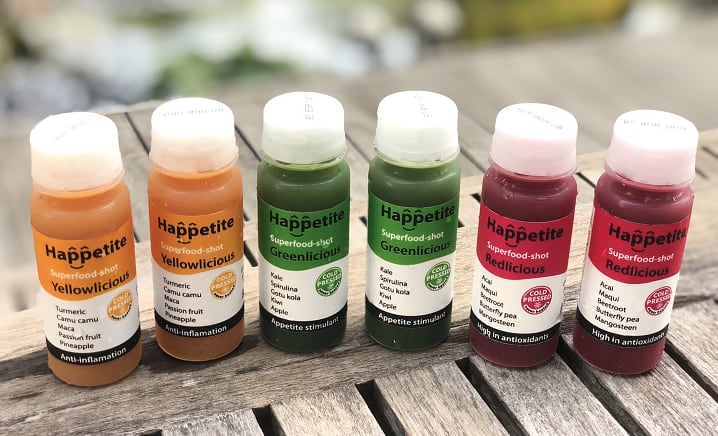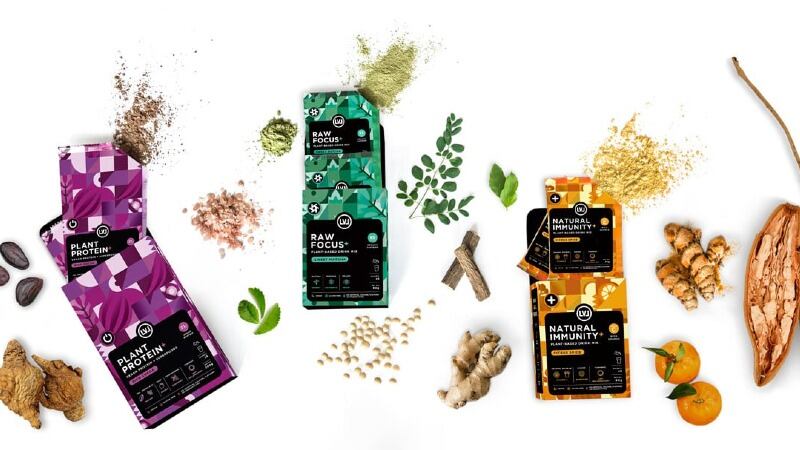Coming in 70ml bottles, the appetiser is made from a mixture of isothiocyanates-rich vegetables – kale, spirulina, gotu kola, kiwi, and apple cold-pressed into a dark green coloured juice. The colour also gives the product its name ‘Greenlicious’.
Using cold press and high-pressure processing (HPP), the beverage shot, having undergone cold pasteurisation, allows cancer patients to enjoy raw veggies and fruits which they are otherwise not allowed to consume due to their weakened immune status.
Happetite is the brainchild of Pornpimon Nunthanawanich, a PhD student majoring in nutrition at the Mahidol University’s Faculty of Public Health.
The brand won the Food Innovation contest organised by Food Innopolis last year and has secured a patent last October.
There are two other products under the Happetite brand.
One of which is Yellowlicious’, a yellow coloured shot consisting of turmeric, camu camu, maca, passion fruit, and pineapple.
The ‘Redlicious’ product, on the other hand, is made from acai berries, maqui, beetroot, butterfly pea, and mangosteens. Designed as an immune defence drink, it is high in polyphenol, anthocyanin, epigallocatechin gallate (EGCG), and quercetin.
Pornpimon told NutraIngredients-Asia that cold pasteurisation enabled the products to last for a longer shelf life, up to 60 days. In comparison, normal fruit juices are only valid for seven to 10 days.
Lack of appetiser products
The idea came about when Pornpimon was working as a senior clinical dietician in the BNH Hospital as part of her masters and PhD study.
One observation which stood out was that the cancer patients had low appetite – a side effect of cancer treatment. In Thailand, malnutrition is the leading cause of death amongst cancer patients in the past five years.
“There are medical foods in the market for replenishing protein and calories in the cancer patients, but some cancer patients can’t eat them because of low appetite.
“We tried to find products to help them improve their appetite but could not find any,” she said.
To resolve the problem, she tried searching for a suitable appetiser for the cancer patients but to no avail. That was when she decided to come out with her own solution.
With her PhD advisor assistant professor Dr Chatrapa Hudthagosol, the duo reviewed existing research papers and came out with the product formulation.
They found that the nutrition recommended for cancer patients have to be 1) high in antioxidant content, 2) improves immunity, and 3) a neutropenic diet.
A neutropenic diet protects cancer patients from bacteria and harmful organisms found in foods and drinks.
Patients would just need to drink one bottle before their meal.
She said that about five to six international and local Thai companies have expressed interest in bringing the product to the market.
High TPC, ORAC content
Aside from being an appetiser, the Happetite products were also found to be high in Total Phenolic Compound (TPC) and Oxygen Radical Antioxidant Capacity (ORAC).
For ‘Greenlicious’, its TPC level was 4,690mg GEA/bottle, which is about 32 times higher than that of green tea, 22 times higher than broccoli, and 21 times higher than blueberries.
‘Yellowlicious’ and ‘Redlicious’ on the other hand, had a TPC of 4,140 and 5,020 respectively.
‘Redlicious’ was also found to have the highest ORAC at 1,133,491 umol TE/bottle, which was over 3,100 times higher than green tea, over 1,000 times higher than broccoli, and 346% higher than blueberries.
The high TPC and ORAC content means that the products are also suitable for healthy individuals, Pornpimon said.
Pilot study
The products are currently undergoing pilot study in Thailand government hospitals.
The study aims to recruit 30 cancer patients and 12 have already finished the study.
Pornpimon said based on the primary findings, there was improvements seen in the patients’ appetite, as well as their calories and protein status.
Patients’ need
A pre-market survey has found that the one thing that cancer patients are looking for is a natural-based product.
Pornpimon said that a survey was conducted amongst cancer patients before the start of Happetite’s R&D process to find out their demands and preferences for a nutrition product.
All of them said in their survey that they would like to have a natural-based product.
Nine in 10 said they would like to have a product that could help them feel refreshed and reduce the side effects of cancer treatment. This was also why a beverage shot was developed.
During the product R&D process, she also found that cancer patients, due to their reduced appetite, could only consume a small amount of liquid at any one time.
Hence, she cut the size of the shot from 250ml to 150ml, before settling for 70ml.
“When the patients cannot finish the beverage, they will blame themselves and feel stressed.
“Once we reduce it to 70ml, they can finish the shot and feel better about themselves, and that’s our goal, we will like to make them happy and improve their quality of life.”



